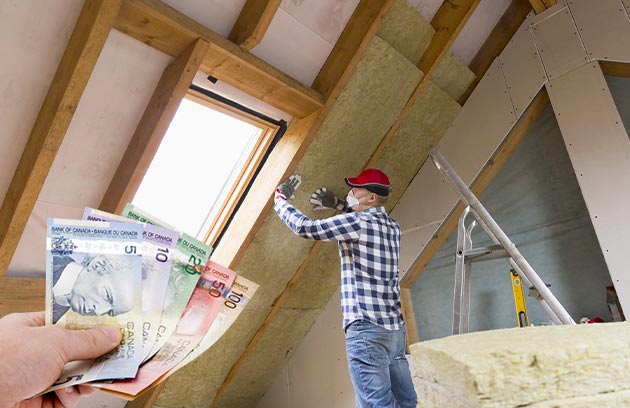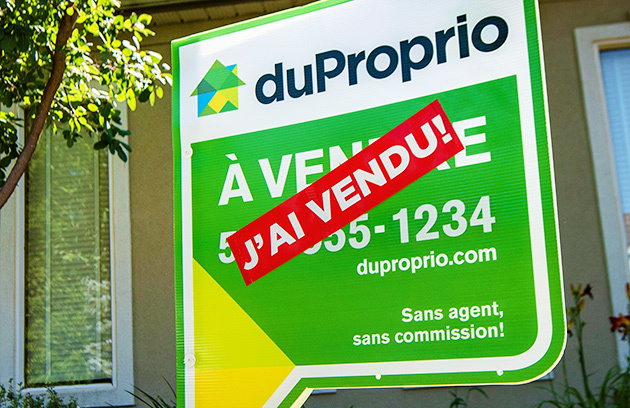What are the latest trends in the Quebec real estate market? Here's relevant information and interesting news about buying and selling a property.

The Quick Real Estate Minute
The latest real estate stats for the Province of Quebec: median selling price, average selling time, inventory of properties, variation of policy interest rate.
-
Housing bubble: origins and impactsWhen the real estate market becomes exceptionally strong very quickly, observers may become concerned that a real estate bubble phenomenon is occurring. But what exactly does that mean?
-
Real estate statistics for the 4th quarter of 2024: inventory starts to dwindle due to key rate cutsStay on top of recent developments in the Quebec real estate market with this quarterly report compiled by the DuProprio team.
-
Real estate statistics for the 3rd quarter of 2024: sales prices reach record highsThe Quebec real estate market remained buoyant in the third quarter, thanks in part to key rate cuts that made home ownership easier for a number of buyers, and to a limited supply of available properties.
-
Property assessment roll: variations and their impactThe property assessment roll determines the amount of municipal taxes payable. Learn how to consult it and understand its impact.
-
6 bathroom trends to inspire your renovations in 2025Whether you want to do some upgrades at home or get it ready to sell, these 2025 bathroom trends will help you create a modern and warm space.
-
Real estate statistics for the 2nd quarter of 2024: market tension remains highThe second quarter continued the momentum from the start of the year, with a notable increase in new property supply and sales, demonstrating that the market is buoyant.
-
Looking for an apartment: a complete guide to rentingHere's everything you need to know about looking for a home that suits your needs, making visits and formalizing everything by signing a lease.
-
Capital gains inclusion rate: 2024 federal budgetAs of June 25, 2024, the capital gains inclusion rate will be increased to 66.7% for the portion of gains in excess of $250,000.
-
Montreal housing market: prices and trendsWill it be easier to break into the Montreal housing market in 2025? Fluctuating interest rates will determine future trends.
-
Real estate statistics for the 4th quarter of 2023: More options but higher pricesSellers kept the market advantage in the fourth quarter despite a marked increase in new listings.
-
Selling with DuProprio’s help: The preferred option of the Protégez-Vous panelDuProprio is the company most appreciated by Quebecers for its real estate services, according to Protégez-Vous.
-
Real estate statistics for the 3rd quarter of 2023: The rate hike is cooling things offThe months of July to September clearly show that, after a very active 2nd quarter, the market has toned down, returning to a similar energy level as was seen in the same quarter of 2022.
-
How to find out how much a home has sold forThe real estate market is always changing, so using verified information when comparing prices can help make the sale of your home go smoothly. Here's how you can find out how much properties have sold for.
-
Real estate statistics for the 2nd quarter of 2023: A slow, non-linear transitionFor the months of April to June, we clearly see conditions that are similar to those for the same quarter of 2022. This could be a sign that the market is improving, as compared to this year’s 1st quarter.
-
1st Quarter 2023 Real Estate Stats: A fragmented market in the provinceFor a long time, the market moved at the same pace province-wide, but we are now seeing increasing disparities between areas. Here is our analysis of the statistics for the first quarter of 2023 and our forecast of what’s coming next, in The Real Estate Minute.
-
The new rule for flipped properties in CanadaSince January 1, 2023, flipped properties in Canada have been subject to a new measure aiming to stop speculation and encourage property prices to come down. Discover the implications of this tax, nicknamed “the anti-flipping rule.”
-
The DNCL: A tool to counter phone solicitationFor DuProprio sellers, like all other Canadian consumers, the National Do Not Call List is a truly invaluable tool. However many people aren’t aware of it. Learn what it is and how it can have a positive impact on a day-to-day basis!
-
Understanding the Canadian ban on non-Canadians buying real estateThe Prohibition on the Purchase of Residential Property by Non-Canadians Act has been extended until January 1st, 2027. Let’s look at the implications of the Act for buyers and sellers in the country.
-
4th Quarter 2022 Real Estate Stats: Growing choice for buyersLooking back, the months of October, November and December 2022 brought us very close to a market that would have buyers and sellers on equal footing. See the statistics for the 4th quarter of 2022 and our forecasts for the beginning of 2023 in this Real Estate Minute.
-
The DuProprio app is backDuProprio is back with an all-new, revamped and improved mobile application. Download it now on your phone!
-
3rd Quarter 2022 Real Estate Stats: The shift toward a balanced market beginsThe most recent quarter is confirming the trends that had been observed previously: a growing inventory of properties, decreasing selling prices and less overbidding. Here’s our snapshot of the 3rd quarter of 2022 and our forecasts for the future in the Quebec market: The Real Estate Minute.
-
Property prices: Ranking of cities with the highest growth since 2020Since 2020, all residential property types gained in value, but single-family homes were most affected, experiencing a price hike of 41% on average in the province. It’s a good time to rank the cities in Quebec that experienced the strongest growth since then.
-
Fall shopping: 50 residential projects to tour during the 2022 Open House WeekendsPresented by DuProprio, the Open House Weekends for Fall 2022, which will take place October 15–16 and October 22–23, from 1 to 5 p.m., will offer visitors a range of discovery activities in about 50 residential sales or rental offices in the Great Montreal.
-
“Sell to win” contest: more than $125,000 in prizes awarded!In celebration of its 25th anniversary, DuProprio was pleased to offer five prizes worth more than $26,500 each as part of its biggest contest ever: “Sell to Win with DuProprio.”
-
2nd Quarter 2022 Real Estate Stats: Heading for a Changing Market in QuebecThe second quarter of 2022 marked a turning point in trends prevailing in the province since 2020. To prepare for what the market has in store for the rest of the year, let’s have a look at the statistical data from April to June 2022 in this Real Estate Minute.
-
Overview of the current real estate marketAlthough the real estate market has recently shown signs of slowing, it is still very favourable to sellers. Let’s have a look at the market statistics, focusing on the data from June 2022 compared to the same month in 2019.
-
Real estate statistics: Understanding the terms behind the numbersLet’s go back to the basics and define the terms used when discussing real estate statistics. This short guide will help you better understand the trends being reported on in our articles in The Real Estate Minute.
-
Bill 5 on Real Estate Brokerage: The End of Double RepresentationThe Bill 5 is a means of regaining control of the market.It includes two significant amendments to the Real Estate Brokerage Act. Discover them!
-
New logo, same promisesTwenty-five years ago, DuProprio’s colourful little house first appeared on “For sale by owner” signs and in the real estate industry. With pride in the road travelled, it is now time for us to revamp our image and, more importantly, reaffirm our commitment.
-
What grants are available to renovate my home?Planning renovations to sell your home, upgrade it or make it more energy efficient? You could be eligible for grants from the provincial or federal government. Here’s an updated list as of spring 2024.
-
1st Quarter 2022 Real Estate Stats: Full Speed Ahead Before a Slowdown?Last year’s trends continued during the 1st quarter of 2022, with a marked increase in property prices, the fastest selling times yet, and a still small inventory. The Real Estate Minute takes stock of the market in Quebec and analyzes the statistics for the 1st quarter of 2022.
-
Selling your home in spring: Pros and consWhen spring comes to Quebec, the snow melts, multicoloured tulips bloom and the terrasses reopen. There’s nothing quite like the joy in the air on those first warm days! So it’s not surprising that plans to buy a property, which had stayed on ice all winter, also reappear in the spring.
-
4th Quarter 2021 Real Estate Stats: Property Sellers Are on a RollSelling has never been easier but buying is a whole other story. To give you a clearer view of the situation, here’s the Quebec Real Estate Pulse for the 4th quarter of 2021.
-
Is the real estate market still red-hot?For months now, the real estate market has been booming due to a combination of a high demand from buyers and a low inventory of available properties.
-
How to Find a Reliable Contractor for Your RenovationsAre you looking to take advantage of the hot housing market by selling your home? Did you just buy a new place that you want to update to your taste? Take the opportunity to renovate and make it even more attractive – if selling, it’ll help you get the best price possible!
-
Should you disclose offer amounts to potential buyers?The phenomena of overbidding and multiple bids in today's market have opened up the debate on the transparency of bids.
-
The 2021 real estate market off to a flying startPressure is rising in Quebec’s real estate market and shows no signs of letting up. The latest government restrictions had no impact on activity and the real estate boom seems to be ramping up as Quebec’s moving date, July 1st, approaches.
-
Why the pandemic shook up the real estate marketReal estate had a spectacular year in 2020 and the market frenzy hasn’t cooled down yet in 2021. Prices are rising, selling times are revving up and over-market bids are turning heads! But why is all this activity happening while Quebec is in the midst of a pandemic?
-
A historic 2020 for DuProprio and real estateThe year 2020 will go down in history as one of the busiest ever in Quebec real estate. The roller-coaster ride of constantly changing COVID-19 health measures didn’t dampen buyers’ interest. As a result, several key market indicators went through the roof.
-
What’s the outlook for the real estate market in 2021?The year 2020 was an exceptional one for real estate. So, early this year, the whole industry waited anxiously to hear how it would be impacted by the stricter health measures announced for January 6. It was with relief that we learned that all activities for the purposes of a real estate transactio
-
Overbidding: the reality in Quebec's real estate market during the pandemicSince spring 2020, competition among buyers has been so fierce that overbidding is now the trend throughout the province. This, higher selling prices and faster selling times are all influenced by market conditions, never by whether a property is sold with or without an agent.
-
"I've always received great service" – André from Québec CityAndré Delisle of Québec City sold his Sainte-Foy home early this summer, celebrating his fifth sale with the help of DuProprio’s services. The sale was marked by the COVID-19 pandemic, but also his participation in our advertising campaign in the months that followed.
-
Real estate industry still going strong this fallSeveral months have passed, each similar to the last, since the resumption of real estate activities in May. Even the second wave of COVID-19 infections and several Quebec regions being declared red zones do not seem to have shaken property sellers’ and buyers' confidence.
-
A record summer for real estate and for DuProprioMost experts had predicted that things would get very busy this summer after weeks of lockdown in the spring that caused a standstill in the real estate market.
-
DuProprio celebrates two wins against the real estate brokerage industryDuProprio is celebrating two new legal victories against the real estate brokerage industry this year. The recent court cases pitting DuProprio against the QPAREB and the OACIQ are the third and fourth wins for our company, in three different legal proceedings.
-
CMHC’s rule-tightening will have little impact on the real estate marketThe Canada Mortgage and Housing Corporation (CMHC) has tightened the eligibility criteria for its mortgage loan insurance. The restrictions are an attempt to reduce housing-related debt and prevent problems for certain Canadian households should house prices fall significantly.
-
3 profitable tips for selling your propertyFor most Quebecers, their home is their most important financial asset. In addition to the emotional value attached to a home, most people also invest a great deal of time and money into it.
-
The advantages of selling commission-free in a fast-moving marketThe real estate sector has grown exponentially in last few months. With the number of sold properties consistently exceeding the number of new listings, inventory is at its lowest level for both houses and condos.
-
The difference between a seller’s and a buyer’s marketLearn the key differences between a buyer's and seller's market and adapt your approach to each situation.
-
DuProprio: 25 years of helping Quebecers sell their homesIt all started in Lévis, Quebec, in 1997, when 21-year-old Nicolas Bouchard founded DuProprio. Armed with a cell phone and a computer, he had no doubt that his service to help homeowners sell without a broker would revolutionize the real estate industry.
-
Who are the real estate professionals?Buying or selling a home is a wonderful venture, but it requires a little help along the way. There are several industry professionals who will help make sure your real estate project is a success.
-
DuProprio and the Real Estate Brokerage ActParti Québécois member Carole Poirier is reported as saying that “DuProprio does not provide comprehensive consumer protection” and that the Real Estate Brokerage Act (REBA) needs to be reviewed to rectify this.
-
Rental website: Easy to use and free!The Rental section of our website has been revamped and we’re very proud of the results! We have also optimized the search tool to make it easier and more enjoyable for potential tenants to find what they are looking for. See how you can take advantage of this exceptional visibility!
-
DuProprio.com is the most liked real estate site in Quebec!We’ve known for many years that Quebecers are naturally turning to DuProprio.com when looking for a property. But now we know that our site is the most liked real estate site in Quebec!
-
New sales record for DuProprio in 2018Boosted by a very active market in 2018, DuProprio has set a new record by helping 20,850 Quebec homeowners sell their property. This is an 8% increase1 over 2017.
-
La Facture shines a light on the protection provided by real estate brokersThe brokerage industry has long said that people are better protected when they sell with a real estate broker rather than directly to a buyer. But this isn’t true.























































